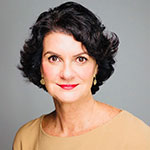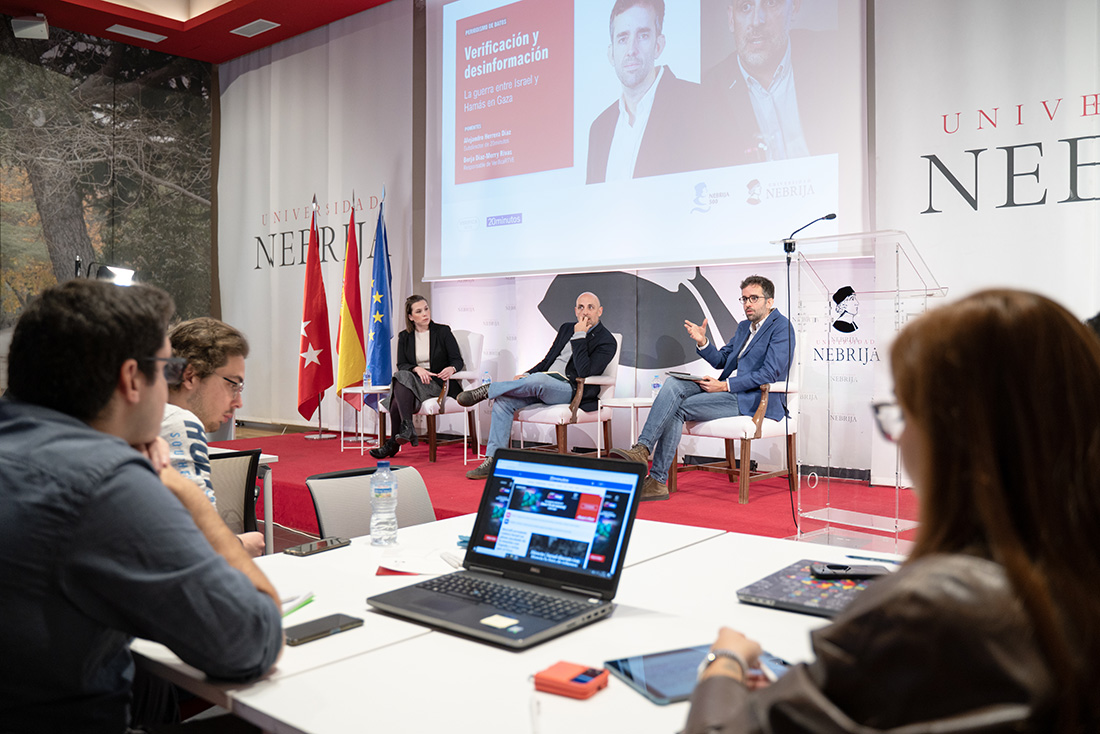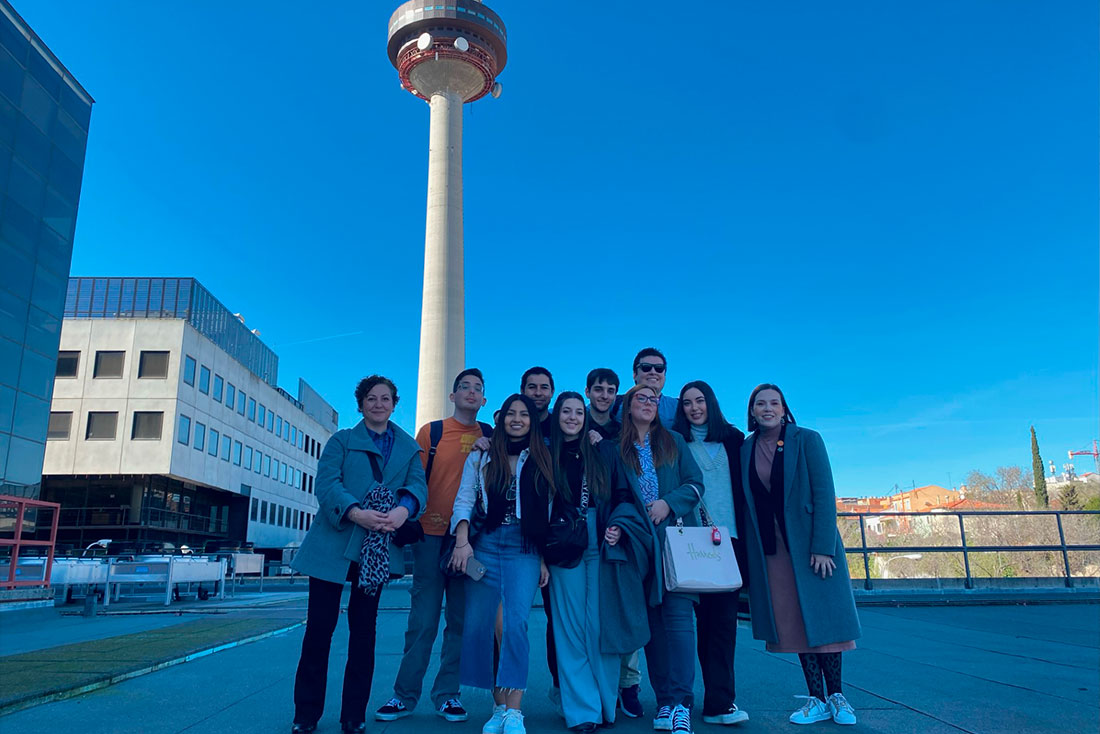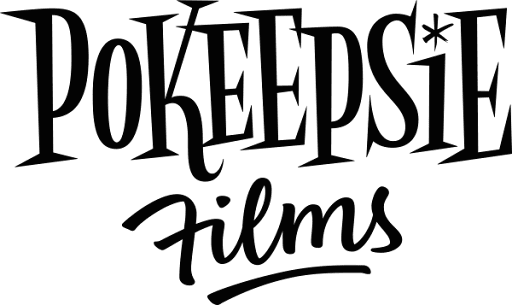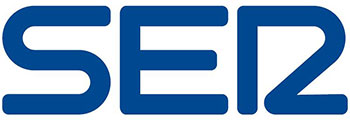Master´s Degree in Digital and Data Journalism 20minutos
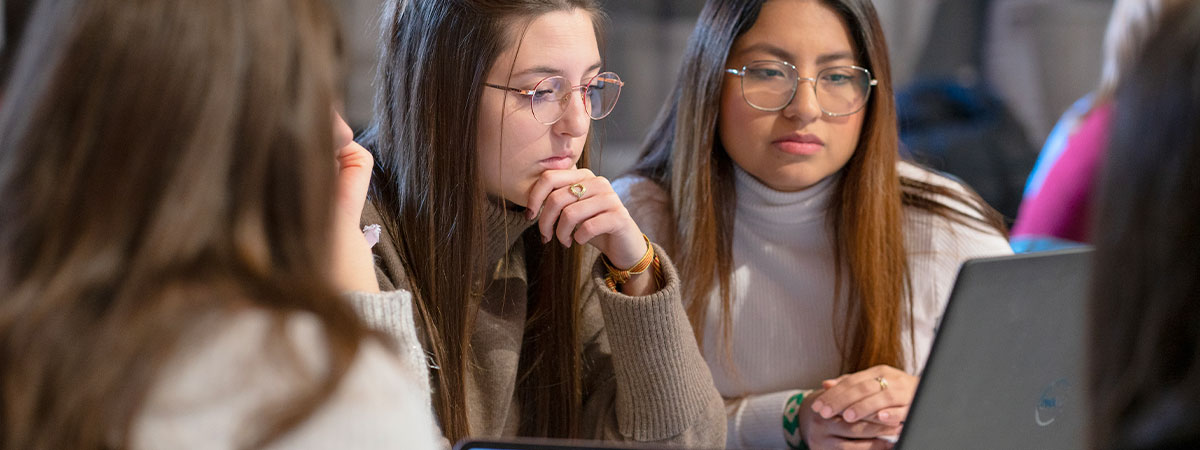
New Tools for Content Creators
The landscape of communication is rapidly evolving, demanding specialized journalists in digital content creation. Keeping pace with this evolution necessitates continual updates to journalism tools, methodologies, and communication strategies.
Our Master's Degree in Digital and Data Journalism equips journalists with the tools to excel as creators of digital content, offering essential technological training and instruction in new narrative techniques tailored to 360-degree communication. As information consumption habits evolve, there arises a growing demand in the professional market for experts in immersive journalism, content planning and development for digital platforms, data visualization, and web analytics. These skills are indispensable for traditional media outlets striving to adapt their formats to the digital realm.
Our curriculum is meticulously curated and continuously updated, featuring instruction from industry-leading professionals. Moreover, our collaboration agreement with 20Minutos, a publication under the Henneo group and a digital information audience leader, ensures our students receive training closely aligned with the demands of the professional world and the evolving narrative needs of contemporary journalism.
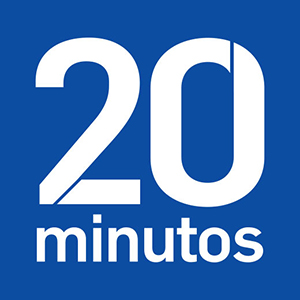
20minutos is the leading general information newspaper in Spain, and belongs to the Henneo group, which has high prestige media, such as El Heraldo de Aragón, La Información and Cinemanía, in addition to television production companies with more than 3,500 annual hours of production.
Taught by prominent professors and active professionals in the digital field
Curriculum
BOE No. 195, of August 12, 2014
All our degrees and curricula have been prepared in accordance with the new guidelines set by current legislation, having already been verified by the National Agency for Quality Assessment.
The student must complete 60 credits
1st Semester30 ECTS
From October to January, both included- 4 ECTS | Informative writing and entertainment on website
- 4 ECTS | Mobile journalism
- 4 ECTS | Audiovisual editing workshop for website
- 6 ECTS | Programming, applications, tools and platforms
- 4 ECTS | Website tracking and analytics
- 4 ECTS | Social Media and Community Manager
- 4 ECTS | Website design
2nd Semester 30 ECTS
From February to June, both included- 4 ECTS | Transmedia journalism
- 4 ECTS | Data journalism I: sources and data processing
- 4 ECTS | Data journalism II: digital tools for visualization and presentation of data
- 4 ECTS | Immersive journalism and 360º projects
- 2 ECTS | Legislation, ethics and citizen participation
- 4 ECTS | External internships
- 8 ECTS | Final Research Project
Professors
| Profesores Professors | Porcentaje de Doctores Percentage of PhD holders |
| 19 | 57,89% |
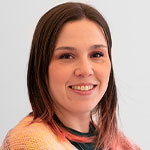 Celia Sancho Belinchón
Directora del Máster en Periodismo Digital y de datos
Celia Sancho Belinchón
Directora del Máster en Periodismo Digital y de datosProfesora de Medios sociales y Community manager Director of the Master´s Degree in Digital and Data Journalism
Professor of Social Media and Community Manager Celia Sancho Belinchón es doctora en Comunicación Audiovisual, Publicidad y Relaciones Públicas. Acreditada por ANECA. Está especializada en comunicación digital, estrategia de comunicación política y comunicación corporativa digital, siendo estas las áreas a las que ha dedicado ocho años de su carrera profesional. Durante los últimos años ha impartido asignaturas relativas a la gestión de contenidos digitales y la comunicación digital en los grados de Periodismo y Comunicación Corporativa. Actualmente es profesora en la facultad de Comunicación y Artes de la Universidad Nebrija y directora del Master de Periodismo Digital y de Datos de esta misma universidad. Cuenta en su currículum con varias publicaciones científicas relativas al estudio de la estrategia digital de los medios de comunicación o el análisis de las plataformas digitales utilizadas en el cine.
 Imen Bouziri Boullosa
Profesora de Periodismo inmersivo y proyectos 360º
Professor of Immersive Journalism and 360º Projects
Doctora en Comunicación Audiovisual (UCM) e investigadora postdoctoral, especialista en medios audiovisuales y tecno-cultura visual popular. También es cineasta experimental y videoensayista. Es experta en estudios fílmicos (teoría, historia y estética del cine), aunque, a través de su proyecto doctoral, ha ido trazando un espacio de investigación sumamente transdisciplinar y desarrollado diversas líneas de investigación entre las cuales: la filosofía, antropología cultural, historia del arte e iconología (política), hermenéuticas simbólicas, estudios comparativos de las mitologías y las religiones, estudios japoneses (y del Asia Oriental), teoría crítica, ludología, anime studies...
Imen Bouziri Boullosa
Profesora de Periodismo inmersivo y proyectos 360º
Professor of Immersive Journalism and 360º Projects
Doctora en Comunicación Audiovisual (UCM) e investigadora postdoctoral, especialista en medios audiovisuales y tecno-cultura visual popular. También es cineasta experimental y videoensayista. Es experta en estudios fílmicos (teoría, historia y estética del cine), aunque, a través de su proyecto doctoral, ha ido trazando un espacio de investigación sumamente transdisciplinar y desarrollado diversas líneas de investigación entre las cuales: la filosofía, antropología cultural, historia del arte e iconología (política), hermenéuticas simbólicas, estudios comparativos de las mitologías y las religiones, estudios japoneses (y del Asia Oriental), teoría crítica, ludología, anime studies...
 Carlos Cotelo Oñate
Profesor de Taller de montaje audiovisual para web
Professor of Audiovisual assembly workshop for web
Doctor en Creatividad por la Facultad de Bellas Artes de la Universidad Complutense de Madrid (2016). Licenciado en Comunicación Audiovisual por la Universidad Pontificia de Salamanca (2000) y su trayectoria profesional y científica está orientada al análisis de las cualidades expresivas de los medios y tecnologías de la comunicación y su impacto en los usuarios en ámbitos educativos y creativos. Su experiencia laboral se ha desarrollado a lo largo de diecisiete años como realizador y editor en canales de televisión, como Antena 3, Canal +, Comedy Central o Cuatro, entre otros.
Carlos Cotelo Oñate
Profesor de Taller de montaje audiovisual para web
Professor of Audiovisual assembly workshop for web
Doctor en Creatividad por la Facultad de Bellas Artes de la Universidad Complutense de Madrid (2016). Licenciado en Comunicación Audiovisual por la Universidad Pontificia de Salamanca (2000) y su trayectoria profesional y científica está orientada al análisis de las cualidades expresivas de los medios y tecnologías de la comunicación y su impacto en los usuarios en ámbitos educativos y creativos. Su experiencia laboral se ha desarrollado a lo largo de diecisiete años como realizador y editor en canales de televisión, como Antena 3, Canal +, Comedy Central o Cuatro, entre otros.
 Celestino Díaz Tristán
Profesor de Diseño web
Professor of Web Design
Doctorando de la Universidad Nebrija. Es técnico superior de Imagen y Sonido (Escuela de Imagen y Sonido de Almería), licenciado en Comunicación Audiovisual (Universidad de Málaga), máster en Diseño Gráfico (Gauss Multimedia), máster de Radio en RNE (Instituto RTVE y Universidad Complutense de Madrid), máster en UX, UI y Product Design (Neoland) y MBA (The Power MBA). Ha trabajado como redactor y fotógrafo del periódico La Voz de Almería y como director, presentador, redactor y productor de programas de Radio y TV en InteralmeríaTV, Cadena SER Almería, RNE, Radio5, Radio3 y Cadena COPE. Desde 2014 trabaja como diseñador gráfico en COPE.
Celestino Díaz Tristán
Profesor de Diseño web
Professor of Web Design
Doctorando de la Universidad Nebrija. Es técnico superior de Imagen y Sonido (Escuela de Imagen y Sonido de Almería), licenciado en Comunicación Audiovisual (Universidad de Málaga), máster en Diseño Gráfico (Gauss Multimedia), máster de Radio en RNE (Instituto RTVE y Universidad Complutense de Madrid), máster en UX, UI y Product Design (Neoland) y MBA (The Power MBA). Ha trabajado como redactor y fotógrafo del periódico La Voz de Almería y como director, presentador, redactor y productor de programas de Radio y TV en InteralmeríaTV, Cadena SER Almería, RNE, Radio5, Radio3 y Cadena COPE. Desde 2014 trabaja como diseñador gráfico en COPE.
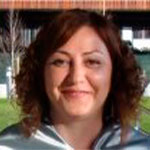 Eva María Ferreras Rodríguez
Profesora de Periodismo de Datos I: fuentes y tratamiento de datos
Professor of Data Journalism I: data sources and processing
Doctora por la Universidad del País Vasco (UPV/EHU, 2010) y acreditada por ANECA, habiendo acumulado un total de 135 horas de docencia. En el ámbito investigador cuento con una docena de publicaciones en revistas indexadas así cómo más de una veintena de contribuciones a Congresos. He sido revisora para varias revistas académicas. He trabajado como periodista en el diario El Día de Valladolid (2001), en la agencia Europa Press (Madrid / 2001-2003) y en el Sindicato de Enfermería SATSE (Bilbao/ 2004-2005).
Eva María Ferreras Rodríguez
Profesora de Periodismo de Datos I: fuentes y tratamiento de datos
Professor of Data Journalism I: data sources and processing
Doctora por la Universidad del País Vasco (UPV/EHU, 2010) y acreditada por ANECA, habiendo acumulado un total de 135 horas de docencia. En el ámbito investigador cuento con una docena de publicaciones en revistas indexadas así cómo más de una veintena de contribuciones a Congresos. He sido revisora para varias revistas académicas. He trabajado como periodista en el diario El Día de Valladolid (2001), en la agencia Europa Press (Madrid / 2001-2003) y en el Sindicato de Enfermería SATSE (Bilbao/ 2004-2005).
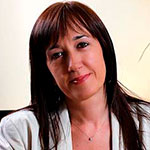 Isabel García Casado
Profesora de Redacción informativa y de entretenimiento en web
Professor of informative and entertainment writing on the web
Doctora cum laude en Ciencias de la Información por la Universidad Complutense de Madrid (UCM). Licenciada en Filología Hispánica por la UCM y Master en Relaciones Internacionales por la UCM. Experta en periodismo, comunicación y marketing en plataformas digitales. He gestionado portales editoriales, marketplaces y de e-commerce, coordinando equipos multidisciplinares (técnicos, editoriales, comerciales y de marketing). Actualmente, Directora Digital del Área Editorial, de Marketing y Comunicación para los portales especializados en motor de Vocento.
Isabel García Casado
Profesora de Redacción informativa y de entretenimiento en web
Professor of informative and entertainment writing on the web
Doctora cum laude en Ciencias de la Información por la Universidad Complutense de Madrid (UCM). Licenciada en Filología Hispánica por la UCM y Master en Relaciones Internacionales por la UCM. Experta en periodismo, comunicación y marketing en plataformas digitales. He gestionado portales editoriales, marketplaces y de e-commerce, coordinando equipos multidisciplinares (técnicos, editoriales, comerciales y de marketing). Actualmente, Directora Digital del Área Editorial, de Marketing y Comunicación para los portales especializados en motor de Vocento.
 Sara González Fernández
Profesora de Periodismo Transmedia
Professor of Transmedia Journalism
Doctora en Comunicación por la Universidad de Sevilla. Licenciada en Periodismo y Máster oficial en Guion, Narrativa y Creatividad Audiovisual. Profesora acreditada por ANECA. Forma parte del Grupo de Investigación “Comunicación estratégica e influencia en la sociedad digital”. Ha trabajado como redactora en medios de comunicación como Diario Jaén, RTVE o Castilla-La Mancha Media. Su ámbito de investigación se centra en la narrativa audiovisual, la violencia mediática y la comunicación digital. Actualmente, se encuentra finalizando sus estudios de grado en Pedagogía por la UNED.
Sara González Fernández
Profesora de Periodismo Transmedia
Professor of Transmedia Journalism
Doctora en Comunicación por la Universidad de Sevilla. Licenciada en Periodismo y Máster oficial en Guion, Narrativa y Creatividad Audiovisual. Profesora acreditada por ANECA. Forma parte del Grupo de Investigación “Comunicación estratégica e influencia en la sociedad digital”. Ha trabajado como redactora en medios de comunicación como Diario Jaén, RTVE o Castilla-La Mancha Media. Su ámbito de investigación se centra en la narrativa audiovisual, la violencia mediática y la comunicación digital. Actualmente, se encuentra finalizando sus estudios de grado en Pedagogía por la UNED.
 Felicidad González Sanz
Profesora de Periodismo Móvil
Professor of Mobile Journalism
Licenciada en Comunicación Audiovisual por la Universidad Complutense de Madrid y Máster Universitario en Formación del Profesorado por la Universidad CEU San Pablo. Su experiencia docente incluye asignaturas como Realización, Dirección de Fotografía y Taller de Proyectos Audiovisuales, además de ejercer como profesora asociada en la materia Dirección de Arte, Guion y Storyboard. Compagina la actividad docente con una trayectoria profesional en los sectores de televisión, cine y publicidad. Sus principales líneas de investigación se centran en el lenguaje audiovisual, las narrativas cinematográficas y el impacto de la inteligencia artificial en el panorama mediático contemporáneo.
Felicidad González Sanz
Profesora de Periodismo Móvil
Professor of Mobile Journalism
Licenciada en Comunicación Audiovisual por la Universidad Complutense de Madrid y Máster Universitario en Formación del Profesorado por la Universidad CEU San Pablo. Su experiencia docente incluye asignaturas como Realización, Dirección de Fotografía y Taller de Proyectos Audiovisuales, además de ejercer como profesora asociada en la materia Dirección de Arte, Guion y Storyboard. Compagina la actividad docente con una trayectoria profesional en los sectores de televisión, cine y publicidad. Sus principales líneas de investigación se centran en el lenguaje audiovisual, las narrativas cinematográficas y el impacto de la inteligencia artificial en el panorama mediático contemporáneo.
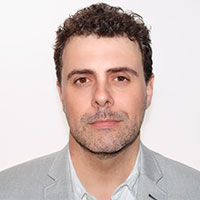 Manuel Hernández Torregrosa
Profesor de Programación, Aplicaciones, Herramientas y Soportes (modalidad online)
Professor of Programming, Applications, Tools and Supports (online mode)
Ingeniero Técnico en Informática de Gestión por la Universidad Carlos III de Madrid, con una extensa trayectoria en roles de liderazgo tecnológico. Su carrera profesional abarca desde la conceptualización hasta la implementación de sistemas que optimizan procesos y mejoran la eficiencia operativa.
Manuel Hernández Torregrosa
Profesor de Programación, Aplicaciones, Herramientas y Soportes (modalidad online)
Professor of Programming, Applications, Tools and Supports (online mode)
Ingeniero Técnico en Informática de Gestión por la Universidad Carlos III de Madrid, con una extensa trayectoria en roles de liderazgo tecnológico. Su carrera profesional abarca desde la conceptualización hasta la implementación de sistemas que optimizan procesos y mejoran la eficiencia operativa.
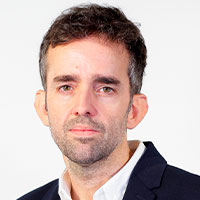 Alejandro Herrera Díaz
Profesor de Periodismo de datos I fuentes y tratamiento
Professor of Data Journalism I sources and treatment
Subdirector de 20minutos con 17 años de experiencia en medios. Es licenciado en Periodismo por la Universidad Complutense y máster MBA en Dirección de Empresas por ESIC, forma parte del equipo de 20minutos desde 2007, al que llegó tras su paso por Marca. Responsable de 20minutos.es y especialista en nuevos formatos y narrativas, distribución de contenidos y transformación digital. En su trayectoria, ha desarrollado tareas de redacción, desarrollo de producto y recientemente ha liderado el rediseño de la web de 20minutos.
Alejandro Herrera Díaz
Profesor de Periodismo de datos I fuentes y tratamiento
Professor of Data Journalism I sources and treatment
Subdirector de 20minutos con 17 años de experiencia en medios. Es licenciado en Periodismo por la Universidad Complutense y máster MBA en Dirección de Empresas por ESIC, forma parte del equipo de 20minutos desde 2007, al que llegó tras su paso por Marca. Responsable de 20minutos.es y especialista en nuevos formatos y narrativas, distribución de contenidos y transformación digital. En su trayectoria, ha desarrollado tareas de redacción, desarrollo de producto y recientemente ha liderado el rediseño de la web de 20minutos.
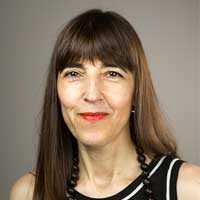 Mercedes Herrero de la Fuente
Profesora de Trabajo de fin de máster
Professor of Master's final project
Doctora en Ciencias de la Información por la Universidad Complutense de Madrid y profesora acreditada para universidad pública y privada por la ACAP. Coordinadora del Doctorado en Innovación en Comunicación Digital. Miembro del claustro permanente de la Universidad Nebrija desde 2015, donde ha dirigido el Máster en Periodismo Digital y de Datos (2016-2021) y el Máster en Periodismo en Televisión (2015-2019) y participado en el diseño académico de otros postgrados, como el Máster en Periodismo y Retransmisiones Deportivas. En esta universidad imparte clase en grado y postgrado. En asignaturas relacionadas con la producción televisiva, la realización de documentales y reportajes y la actualidad internacional. Ha sido docente en otras universidades, como la UCM y la Universidad Camilo José Cela, en especial en el área de postgrado. Ha desarrollado su labor investigadora en diferentes universidades extranjeras, como la Cornell University (EE.UU.), la University of Salford (Reino Unido), la Radboud Universiteit (Países Bajos) y la Univerzita Karlova (República Checa).
Mercedes Herrero de la Fuente
Profesora de Trabajo de fin de máster
Professor of Master's final project
Doctora en Ciencias de la Información por la Universidad Complutense de Madrid y profesora acreditada para universidad pública y privada por la ACAP. Coordinadora del Doctorado en Innovación en Comunicación Digital. Miembro del claustro permanente de la Universidad Nebrija desde 2015, donde ha dirigido el Máster en Periodismo Digital y de Datos (2016-2021) y el Máster en Periodismo en Televisión (2015-2019) y participado en el diseño académico de otros postgrados, como el Máster en Periodismo y Retransmisiones Deportivas. En esta universidad imparte clase en grado y postgrado. En asignaturas relacionadas con la producción televisiva, la realización de documentales y reportajes y la actualidad internacional. Ha sido docente en otras universidades, como la UCM y la Universidad Camilo José Cela, en especial en el área de postgrado. Ha desarrollado su labor investigadora en diferentes universidades extranjeras, como la Cornell University (EE.UU.), la University of Salford (Reino Unido), la Radboud Universiteit (Países Bajos) y la Univerzita Karlova (República Checa).
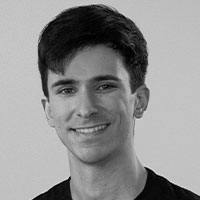 Adrián Herrero Montoya
Profesor de Diseño Web
Professor of Web design
Graduado en Comunicación Audiovisual por la Universidad Rey Juan Carlos de Madrid. Diseñador gráfico y Front-end developer en verticales y proyectos digitales del grupo Atresmedia Digital, como Antena3.com, laSexta.com, Ondacero.es o Atresplayer.com. Tiene experiencia docente en EAE Business School Madrid en el área de maquetación web y dominio de tecnologías web y CMS para periodistas digitales.
Adrián Herrero Montoya
Profesor de Diseño Web
Professor of Web design
Graduado en Comunicación Audiovisual por la Universidad Rey Juan Carlos de Madrid. Diseñador gráfico y Front-end developer en verticales y proyectos digitales del grupo Atresmedia Digital, como Antena3.com, laSexta.com, Ondacero.es o Atresplayer.com. Tiene experiencia docente en EAE Business School Madrid en el área de maquetación web y dominio de tecnologías web y CMS para periodistas digitales.
 Manuel Martín Esparza
Profesor de Medición y Analítica Web
Professor of Measurement and web analytics
Master en Business Administration (M.B.A.) por la University College Dublin, Licenciado en Ciencias Empresariales por la Universidad Autónoma de Madrid y Postgrado en Marketing y Ventas por la École de Commerce de Lyon.Especialista en posicionamiento de pago (PPC), CEO en PanEuro Search Marketing.Ha trabajado en Google, Amadeus, IE Business School, Unilever y Danone, entre otras.
Manuel Martín Esparza
Profesor de Medición y Analítica Web
Professor of Measurement and web analytics
Master en Business Administration (M.B.A.) por la University College Dublin, Licenciado en Ciencias Empresariales por la Universidad Autónoma de Madrid y Postgrado en Marketing y Ventas por la École de Commerce de Lyon.Especialista en posicionamiento de pago (PPC), CEO en PanEuro Search Marketing.Ha trabajado en Google, Amadeus, IE Business School, Unilever y Danone, entre otras.
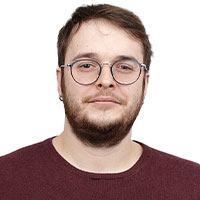 Jorge Millán
Profesor de Periodismo de datos II: herramientas digitales para la visualización y presentación de datos
Professor of Data Journalism II: digital tools for data visualization and presentation
Graduado en Periodismo y Comunicación Audiovisual por la Universidad Rey Juan Carlos. Trabajo en 20minutos desde 2019, pero antes pasé por la sección de Internacional del diario El Mundo. En el periódico soy redactor especializado en Economía y Datos desde 2021. Me paso los días revoloteando entre bases de datos, hojas de cálculo, gráficos, tablas y mapas buscando historias que interesen a las personas.
Jorge Millán
Profesor de Periodismo de datos II: herramientas digitales para la visualización y presentación de datos
Professor of Data Journalism II: digital tools for data visualization and presentation
Graduado en Periodismo y Comunicación Audiovisual por la Universidad Rey Juan Carlos. Trabajo en 20minutos desde 2019, pero antes pasé por la sección de Internacional del diario El Mundo. En el periódico soy redactor especializado en Economía y Datos desde 2021. Me paso los días revoloteando entre bases de datos, hojas de cálculo, gráficos, tablas y mapas buscando historias que interesen a las personas.
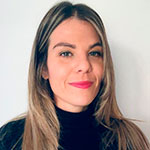 Victoria Isabel Moreno Gil
Profesora académica de Prácticas Externas
Professor of Academic External Internships
Doctora en Periodismo. Acreditada por ANECA. Licenciada en Periodismo y Comunicación Audiovisual. Su trayectoria profesional está ligada a la docencia y al ejercicio del periodismo en distintos medios de comunicación como redactora: principalmente en televisión (El Mundo TV, Intereconomía), pero también en radio (Cadena Ser), agencia de noticias (EFE) y medios digitales. Asimismo, cuenta con una dilatada experiencia en la cobertura de eventos mediáticos, elaboración de guiones y reportajes audiovisuales como freelance. Combina su labor docente con la de investigadora en el campo de la ética periodística y la alfabetización mediática. Ha participado como ponente en distintos seminarios académicos y, recientemente, ha realizado una estancia postdoctoral en calidad de profesora visitante. En el marco de la educación no formal, ha impartido clases de Inglés y de Lengua y Literatura.
Victoria Isabel Moreno Gil
Profesora académica de Prácticas Externas
Professor of Academic External Internships
Doctora en Periodismo. Acreditada por ANECA. Licenciada en Periodismo y Comunicación Audiovisual. Su trayectoria profesional está ligada a la docencia y al ejercicio del periodismo en distintos medios de comunicación como redactora: principalmente en televisión (El Mundo TV, Intereconomía), pero también en radio (Cadena Ser), agencia de noticias (EFE) y medios digitales. Asimismo, cuenta con una dilatada experiencia en la cobertura de eventos mediáticos, elaboración de guiones y reportajes audiovisuales como freelance. Combina su labor docente con la de investigadora en el campo de la ética periodística y la alfabetización mediática. Ha participado como ponente en distintos seminarios académicos y, recientemente, ha realizado una estancia postdoctoral en calidad de profesora visitante. En el marco de la educación no formal, ha impartido clases de Inglés y de Lengua y Literatura.
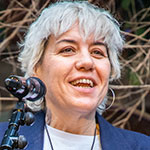 Mª del Mar Ramos Rodríguez
Coordinadora de prácticas de la FCA
FCA Internship Coordinator
Doctora en Bellas Artes por la Universidad Complutense de Madrid. Licenciada en Ciencias de la Imagen y Sonido por la misma universidad. Su práctica profesional se ha desarrollado en el mundo de la fotografía, la producción audiovisual y el diseño gráfico y editorial. Destaca su experiencia laboral en el mundo de la publicidad cinematográfica, en estudios de diseño y en la productora cinematográfica CineCompany, así como en las empresas de comunicación editorial Grupo Zeta y Vocento. En la Universidad de Nebrija imparte docencia desde 1998 en programas de grado y postgrado en las áreas de Comunicación Audiovisual, Periodismo y Publicidad al tiempo que lo compagina con proyectos gráficos y audiovisuales para empresas e instituciones. Desde el año 2022 es la coordinadora académica de Prácticas de la Facultad de Comunicación y Artes.
Mª del Mar Ramos Rodríguez
Coordinadora de prácticas de la FCA
FCA Internship Coordinator
Doctora en Bellas Artes por la Universidad Complutense de Madrid. Licenciada en Ciencias de la Imagen y Sonido por la misma universidad. Su práctica profesional se ha desarrollado en el mundo de la fotografía, la producción audiovisual y el diseño gráfico y editorial. Destaca su experiencia laboral en el mundo de la publicidad cinematográfica, en estudios de diseño y en la productora cinematográfica CineCompany, así como en las empresas de comunicación editorial Grupo Zeta y Vocento. En la Universidad de Nebrija imparte docencia desde 1998 en programas de grado y postgrado en las áreas de Comunicación Audiovisual, Periodismo y Publicidad al tiempo que lo compagina con proyectos gráficos y audiovisuales para empresas e instituciones. Desde el año 2022 es la coordinadora académica de Prácticas de la Facultad de Comunicación y Artes.
 Beatriz Sanjurjo Rebollo
Profesora de Legislación, ética y participación ciudadana
Professor of Legislation, ethics and citizen participation
Doctora cum laude en Derecho por la Universidad Autónoma de Madrid. Profesora Acreditada por ANECA. Licenciada en Derecho por la Universidad Autónoma de Madrid. Diploma de Especialización en Derecho Constitucional y Ciencias Políticas por el Centro de Estudios Políticos y Constitucionales. Dirección de Personal y Recursos Humanos por la Escuela de Organización Industrial. Dirección y Gestión Empresarial por la Universidad Politécnica de Madrid. Experta en Comercio Internacional por la Universidad Autónoma de Madrid. Académica correspondiente de la Real Academia de Jurisprudencia y Legislación. Abogada en ejercicio del Ilustre Colegio de Abogados de Madrid y profesora universitaria de Derecho. Especialista en Derecho de la Información y Nuevas Tecnologías.
Beatriz Sanjurjo Rebollo
Profesora de Legislación, ética y participación ciudadana
Professor of Legislation, ethics and citizen participation
Doctora cum laude en Derecho por la Universidad Autónoma de Madrid. Profesora Acreditada por ANECA. Licenciada en Derecho por la Universidad Autónoma de Madrid. Diploma de Especialización en Derecho Constitucional y Ciencias Políticas por el Centro de Estudios Políticos y Constitucionales. Dirección de Personal y Recursos Humanos por la Escuela de Organización Industrial. Dirección y Gestión Empresarial por la Universidad Politécnica de Madrid. Experta en Comercio Internacional por la Universidad Autónoma de Madrid. Académica correspondiente de la Real Academia de Jurisprudencia y Legislación. Abogada en ejercicio del Ilustre Colegio de Abogados de Madrid y profesora universitaria de Derecho. Especialista en Derecho de la Información y Nuevas Tecnologías.
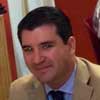 Jorge Sedeño López
Profesor de Programación, Aplicaciones, Herramientas y Soportes
Professor of Programming, Applications, Tools and Support
Doctor en Ingeniería Informática, Máster en Gestión de las Tecnologías de la Información y las Comunicaciones e Ingeniero en Informática, acreditado por la ANECA. Cuenta con una dilatada experiencia profesional de más de 20 años en diferentes Administraciones Públicas y pertenece al Cuerpo Superior de Sistemas y Tecnologías de la Información de la Administración del Estado y al Cuerpo de Expertos en Tecnología de la Información del Banco de España. Sus líneas de trabajo están orientadas a la transformación digital, las metodologías ágiles, el Gobierno Electrónico, la Oficina del Dato y la Inteligencia Artificial.
Jorge Sedeño López
Profesor de Programación, Aplicaciones, Herramientas y Soportes
Professor of Programming, Applications, Tools and Support
Doctor en Ingeniería Informática, Máster en Gestión de las Tecnologías de la Información y las Comunicaciones e Ingeniero en Informática, acreditado por la ANECA. Cuenta con una dilatada experiencia profesional de más de 20 años en diferentes Administraciones Públicas y pertenece al Cuerpo Superior de Sistemas y Tecnologías de la Información de la Administración del Estado y al Cuerpo de Expertos en Tecnología de la Información del Banco de España. Sus líneas de trabajo están orientadas a la transformación digital, las metodologías ágiles, el Gobierno Electrónico, la Oficina del Dato y la Inteligencia Artificial.
 Carlos Serrano Ortega
Profesor de Periodismo Transmedia
Professor of Transmedia Journalism
Licenciado en Periodismo y Economía. Cuenta con una dilatada experiencia en periodismo, comunicación digital y corporativa. Ha trabajado en medios como 'El Economista', '20minutos' o la agencia de noticias 'Europa Press', donde ha desarrollado una sólida experiencia en la producción de contenidos informativos adaptados a distintos formatos y plataformas. En la actualidad, es director de Desarrollo de Negocio e Innovación en 'El Economista', donde lidera iniciativas orientadas a la transformación digital, la innovación editorial y la mejora y desarrollo del producto.
Carlos Serrano Ortega
Profesor de Periodismo Transmedia
Professor of Transmedia Journalism
Licenciado en Periodismo y Economía. Cuenta con una dilatada experiencia en periodismo, comunicación digital y corporativa. Ha trabajado en medios como 'El Economista', '20minutos' o la agencia de noticias 'Europa Press', donde ha desarrollado una sólida experiencia en la producción de contenidos informativos adaptados a distintos formatos y plataformas. En la actualidad, es director de Desarrollo de Negocio e Innovación en 'El Economista', donde lidera iniciativas orientadas a la transformación digital, la innovación editorial y la mejora y desarrollo del producto.
More Academic Information
Official Degree:Master's Degree in Digital and Data Journalism
Those interested in studying and obtaining the degree of Master's Degree in Digital and Data Journalism from Nebrija University will seek specialization in the communication and digital information sector in all its new aspects. They should be restless, have critical judgment and be willing to report on current issues through the most innovative platforms. They will be people familiar with the latest technological tools, capable of adapting quickly to new processes of content creation and management. They can be journalists with or without experience, graduates in related degrees, such as advertising or marketing, or graduates in various specialties who are interested in academic or professional research, where the analysis of data sets and their visualization is necessary.
Professionals specialized in the field of digital and data journalism, with advanced technological knowledge and skills, which are necessary to work in an online communicative environment where media converge and platforms multiply, leading to a consumption of diverse and changing information content.
60 ECTS credits.
Minimum 12 ECTS and maximum 60 ECTS per registration and academic period
Center responsible:School of Communication and Arts
Branch of knowledge:Social and Legal Sciences
Available places: Total: 100
Classroom attendance mode: 30
Online: 70
Type of Education: Classroom attendance / Online
Academic year in which it was implemented: 2013-2014
Languages: Spanish
Duration: 1 year. From October to June
Schedule: from Monday to Friday, afternoons
University Services: [+info]
Skills
General Skills- GC1- Master oral and written language in Spanish as a necessary strength of a professional communicator.
- GC2- Apply the acquired knowledge with resolution and efficiency in the development of professional activity within the context of digital communication, either as multimedia editors, web content editors, communication directors, portal managers, audience analysts or researchers-documentalists in digital media or other related professional careers.
- GC3- Apply the competences, abilities and skills acquired during the training program both in the professional environment of digital communication as well as in the professional career in the sector.
- GC4- Integrate knowledge in order to be able to express judgments based on a limitation of information, including reflections on social, business, economic and ethical aspects that interact with web journalism.
- GC5- Solve problems and make effective decisions in high-competitive level situations and with a high degree of uncertainty, typical of the communication industries at present.
- GC6- Master the compilation, differentiation and categorization of information from bibliographic and documentary sources, both conventional and digital.
- GC7- Communicate conclusions after carrying out an analysis and the arguments that support them, in a clear and effective way, both to specialized digital communication and non-specialized publics.
- GC8- Use ingenuity and develop creativity especially in communicative processes that require a high degree of competitiveness and professionalism for its resolution.
- GC9- Advanced management of new communication technologies, an essential domain in web journalism.
- GC10- Demonstrate the ability to effectively lead and manage projects, assuming the principles of social responsibility and showing skills for autonomous learning in order to adapt to the changing environments of communication.
- GC11- Demonstrate the ability to work effectively in a team, in the development of digital communication projects.
- GC12- Acquire an ethical commitment at work by mastering the legal system of information, applied especially to the professional practice of the web journalist.
- GC13- Demonstrate social sensitivity in the development of their professional work, in compliance with current regulations at both the Spanish and European levels, the codes of good practice, the criteria of self-control, equality of the sexes, special needs of people with disabilities, the protection of children and, in general, the principles contained in the Spanish Constitution and the values of the Culture of Peace.
- SC1- Design, plan and write informative and entertainment pieces for digital media knowing how to apply the advanced procedures and methods required in the search engine positioning process.
- SC2- Communicate current affairs by mastering the language of the digital media and entertainment.
- SC3- Master the foundations of digital journalism to define the journalistic style, structure, genres, techniques, sources and conditions that best present current information.
- SC4- Master the advanced handling of mobile devices in order to record both informative and entertainment audiovisual pieces for digital media, applying the recording techniques, lighting, digital effects and relevant sound, obtaining a professional result.
- SC5- Master editing and staging techniques to create informative and/or entertainment audiovisual pieces that will be broadcast in digital media.
- SC6- Employ the esthetic and technical foundations of web editing for a professional use by combining a theoretical-practical nature.
- SC7- Manage technological tools in an advanced manner to organize the sound and visual materials according to a predicted narrative structure.
- SC8: Know and manage the digital tools that manage the numerous data and sources to be able to select, differentiate and make the most of relevant data and sources for current information and transform them into a journalistic story.
- SC9: Prepare journalistic content adapted to its consumption through all types of supports and convergent platforms that include the use of virtual technologies, offering the user an immersive experience in the journalistic story.
- SC10: Design and edit digital content considering the principles of programming and coding, essential in the development of digital content and in the 2.0 coexistence, with an advanced management of the different content managers.
- SC11: Know and understand the advanced concepts of web design and architecture, as well as computer techniques for the representation and transmission of facts and data through professional infographic systems.
- SC12: Elaborate innovative and versatile journalistic and/or audiovisual content, capable of adapting to different media and digital platforms or interconnected applications.
- SC13: Professionally manage the content managers of web pages to provide immediacy to information processes, combining the creation of journalistic texts with the production of real-time videos and audios.
- SC14: Create, identify and manage the contents and formats of social networks and virtual communities, taking into account the online reputation and digital identity of the signatures.
- SC15: Organize the content of social media, prioritizing information and presenting it in an attractive way for the audience, interrelating contents, formats and networks.
- SC16: Know the legislation applicable to the 2.0 environment. that influences the journalist's professional practice as intellectual property or copyright.
- SC17: Master the journalistic deontological code and know how to apply it in solving problems derived from the new web environment.
- SC18: Analyze the information coming from citizens, followers of different media, facilitated through social channels, promoting participation and interactivity with advanced analytical tools.
- SC19: Evaluate the needs of the media's audience by interpreting their preferences, consumption habits and navigation routes to adapt the information product and obtain more followers.
- SC20: Resolve the channeling of followers to a website based on the active participation of the citizen in content and activities displayed on the website.
- SC21: Understand and apply in the Network the different journalistic specializations (economy, justice, politics, international, culture, society, sports, science, health, technology ... and new fields that arise in the knowledge society) to create added-value content compared to those offered in conventional media.
- SC22: Differentiate new subjects and approaches in each area of expertise with professionalism, speed and informative rigor.
- SC23: Master the slang and the specific sources of each area of specialization to be able to create informative content of each section and focused on the digital environment.
- SC24: Devise, plan and produce specific web content that gives added value to online channels.
- SC25: Conduct and produce interviews and informative reports for digital media, respecting the characteristics of the online environment.
- SC26: Identify the keys of investigative journalism applying advanced criteria of selection of sources, and categorizing the data to offer accurate, rigorous and original information.
- SC27: Build and manage a digital brand of his own, that provides entity, reputation, contacts and visibility to the journalist in the 2.0. world.
- SC28: Master the main variables for measuring results in the online environment and the technological tools available to optimize media and increase user traffic.
- SC29: Control the elements of programming and cutting-edge technological tools in the construction of webpages and digital content.
- SC30: Develop, present and defend a final project on Web Journalism in which the competences acquired are synthesized and integrated.
- SC31: Apply in a practical way the knowledge on Web Journalism acquired in the training program during his/her professional activity.
Online Studies
Access and Admission
It is an essential requirement to access the Master's programs to have a Bachelor's degree or equivalent in accordance with the current legislation. A Bachelor's Degree in Communication Sciences (Journalism, Audiovisual Communication, Advertising and Public Relations) will be especially valued. In this sense, we are looking for students who have skills that foresee a good disposition for teamwork, have great flexibility and open-mindedness to the incorporation of new knowledge and new ways of working, and that, regardless of what scientific or technical studies they come from, they show a great interest in the humanities in general, and a great sense of social responsibility in professional work.
The admission process to the Master's degree begins by sending the following documentation by post or courier to the Postgraduate Admissions Section:
- Completed Admission Application.
- Updated Curriculum Vitae.
- Photocopy of DNI (only Spanish candidates) or passport (only foreign candidates).
- Photocopy of the Academic transcript/record (completed studies or in the last year of the university degree).
- Two color, passport-size photographs.
Once the documentation has been received and it has been verified that the diploma submitted grants to the degree, as established in Arts. 15 and 16 of Royal Decree 1393/2007, candidates take the admission test with the coordinator of the degree. This test is carried out in person in Madrid when possible or, failing that, it can also be taken remotely (online) for those candidates residing outside of Spain.
The candidate holds a personal interview with the Program Coordinator. This interview is in itself an admission test in which the specific knowledge of the candidate is evaluated through a battery of questions about the area of knowledge, as well as their level of maturity and attitudes to it. After this interview, the coordinator prepares a report on the candidate's skills profile, his degree of maturity, his personal interest in Audiovisual Journalism and his suitability for the degree, which is attached to the file that the Admissions Commission will assess.
The University Admissions Commission, made up of heads of the Department itself, the General Secretary and the Department of University Development will be in charge of proposing to the Rector of the University the granting of student status to those candidates whose suitability has been proven.
The candidate receives written information about their admission, which is previously provided by phone, about the result of the admission process and formalizing their enrollment in the Program, the definitive documentation, duly legalized, that must be submitted, etc.
Employability
Career Opportunities
The faculty of the School of Communication and Arts is made up of professionals from each field of specialization, who develop a teaching method based on the conviction that what we learn, we learn by doing it.
Integration into the profession is based on the incorporation of professionals such as associate professors who guarantee each program, on a teaching methodology inspired by the learning-by-doing model that impacts the experiential aspect in the classrooms and in the activities of academic extension.
The Master's Degree in Digital and Data Journalism trains professionals who in the future may work as the following:
Internships
These are some of the companies and programs where the students of the Master's Degree in Digital and Data Journalism have carried out internships in recent years:
- Movistar
- 20minutos
- Prisacom
- Mediapro
- TVE
- La Sexta Noticias
- Diario ABC
- Cadena Cope
- Cadena SER
- Atresmedia
- Mediaset
- Telemadrid
- Capital Radio Economía
Your Master's Degree in Digital and Data Journalism
Activities 2024-25
 20-03-2025
20-03-2025
Masterclass on New Narratives in Journalism with Héctor Garrido: On March 20, Héctor Garrido, editor-in-chief of 20minutos, led a special masterclass for graduate students, exploring the latest advancements in storytelling techniques for journalism. Throughout the session, students learned how to integrate immersive journalism, virtual reality, and technology-driven narrative strategies into their work.
Masterclass: Data Journalism from a Professional Perspective
During the second semester, Nebrija University welcomed several professionals from the field of data journalism to provide students with firsthand insights into data management within media outlets. We had the privilege of hosting four prominent journalism professionals: Nelly Luna, Olaya Argüeso, Darío Ojeda, and Eduard Martín-Borregón. These individuals delivered four masterclasses discussing the current state of data journalism, the challenges journalists face in acquiring data that sheds light and truth on news stories... In essence, these sessions were invaluable opportunities for students to learn directly from accomplished professionals about the state of journalism today. For further details on the careers of these four professionals:
 13-03-2024
13-03-2024
Masterclass_Eduard-Martín Borregón . He is a journalist specializing in data journalism, having commenced his career in the Data Journalism section of El Periódico de Catalunya. He has since worked as a freelance data journalist for various notable entities including El Mundo, the Gates Foundation, Antoni Gutiérrez-Rubí, and Ara.cat, among others.
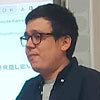 11-03-2024
11-03-2024
Masterclass_Darío Ojeda . Journalist and coordinator of the Data Relay Department. He began his career at Canarias7 and has predominantly focused on sports journalism, notably at El Confidencial, where he was also involved in the data team. Additionally, he has contributed to Atlántico Hoy and Fundación Maldita, among other media outlets.
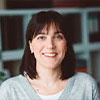 04-03-2024
04-03-2024
Masterclass_Olaya Argüeso . She is a data journalist who views journalism as a catalyst for change. After working in the press department of a multinational corporation for a time, she returned to her true passion. Upon discovering data journalism and its potential for pursuing stories of public interest, she dedicated herself to uncovering untold narratives. Presently, she delves into datasets to unearth unpublished stories and also shares her expertise by teaching data journalism in Spain and Latin America.
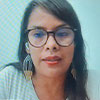 28-02-2024
28-02-2024
Masterclass_Nelly Luna. Journalist and co-founder of OjoPúblico. Her investigative work has garnered international acclaim, including the Global Data Journalism Award on two occasions. Additionally, she has been honored with the Inter-American Press Association Award and was named a finalist in the Gabo Awards.
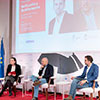 28-11-2023
28-11-2023
Verification and Disinformation in Wartime.
Students from the Master's Degree in Digital and Data Journalism at Nebrija University recently participated in a conference dedicated to verification and disinformation, specifically addressing the conflict between Israel and Hamas in Gaza. The event featured notable speakers such as Alejandro Herrera Díaz, Deputy Director of 20Minutos, and Borja Díaz-Merry Rivas, Head of VerificaRTVE, the RTVE section dedicated to identifying false information. Moderated by Celia Sancho Belinchón, Director of the master's degree program, the session included a roundtable discussion and practical activities. [Read more]
Verification versus Disinformation:
The Gaza Conflict
How should data journalists navigate times of war? Is Artificial Intelligence a helpful ally or a hindrance to journalists? What tools does journalism possess to combat the spread of fake news?
These critical questions were addressed by students of the Master's Degree in Digital and Data Journalism on Monday, November 27, during a conference organized by the postgraduate program in the Assembly Hall of Nebrija University's School of Communication and Arts. Moderated by the program director, Celia Sancho Belinchón, a roundtable discussion featuring Alejandro Herrera Díaz, Deputy Director of 20Minutos, and Borja Díaz-Merry, Head of RTVEVerifica, shed light on the tools available to journalists in the fight against misinformation.
During the session, both journalists underscored the importance of verifying information before dissemination, emphasizing the need for journalistic rigor. As Alejandro Herrera aptly stated, "It is better to take a few minutes to confirm the veracity of content than to regret it later."
Read LessThe master's students visit the VerificaRTVE team
On Tuesday, February 20, the students of the Master's Degree in Digital and Data Journalism had the opportunity to visit the facilities, studios, and offices of RTVE, guided by the head of VerificaRTVE, Borja Díaz-Merry.
Díaz-Merry gave them a tour of the RTVE studios near O'Donnell, where the students witnessed the live production of the 24-hour news broadcast and explored various recording studio locations. A highlight of the visit was meeting the VerificaRTVE team, responsible for debunking hoaxes and verifying information circulating on social networks and the internet. Furthermore, the digital communication team of public radio and television showed the students how they work on traditional projects and shared insights into their methods for generating new content targeted at engaging younger audiences.
XIII NIPHO Awards Edition
The School of Communication and Arts of the Nebrija University celebrates the NIPHO contest again, in this case, its 12 + 1 edition, which awards the best journalistic works of the students in different categories: written press, television, radio, photography... In addition, it recognizes the career of two great professionals. On this occasion, the winners will be Mercedes Milá and Eva Tribiño.
Jon Sistiaga in the conference "Nebrija Journalists"
The journalist Jon Sistiaga starred in the second session of the 'Nebrija Journalists' conference organized by Nebrija University's School of Communication Sciences.
Communication Week
At Nebrija University, we celebrate #NebrijaFCA Week every year. The first day of the Week of Communication and the Arts featured the visit of Risto Mejide, the #NebrijaFashionArte exhibition and a radio marathon.

Las fake news y las redes sociales en el escenario de la docencia
Las fake news son uno de los mayores desafíos que tiene la humanidad en nuestro tiempo de sobreinformación. Este tema tan interesante como necesario aborda Laura Martínez Otón, directora del Máster en Radio, Podcast y Audio Digital – Cadena SER, en su último libro, presentado en la Universidad Nebrija. [Leer más]

